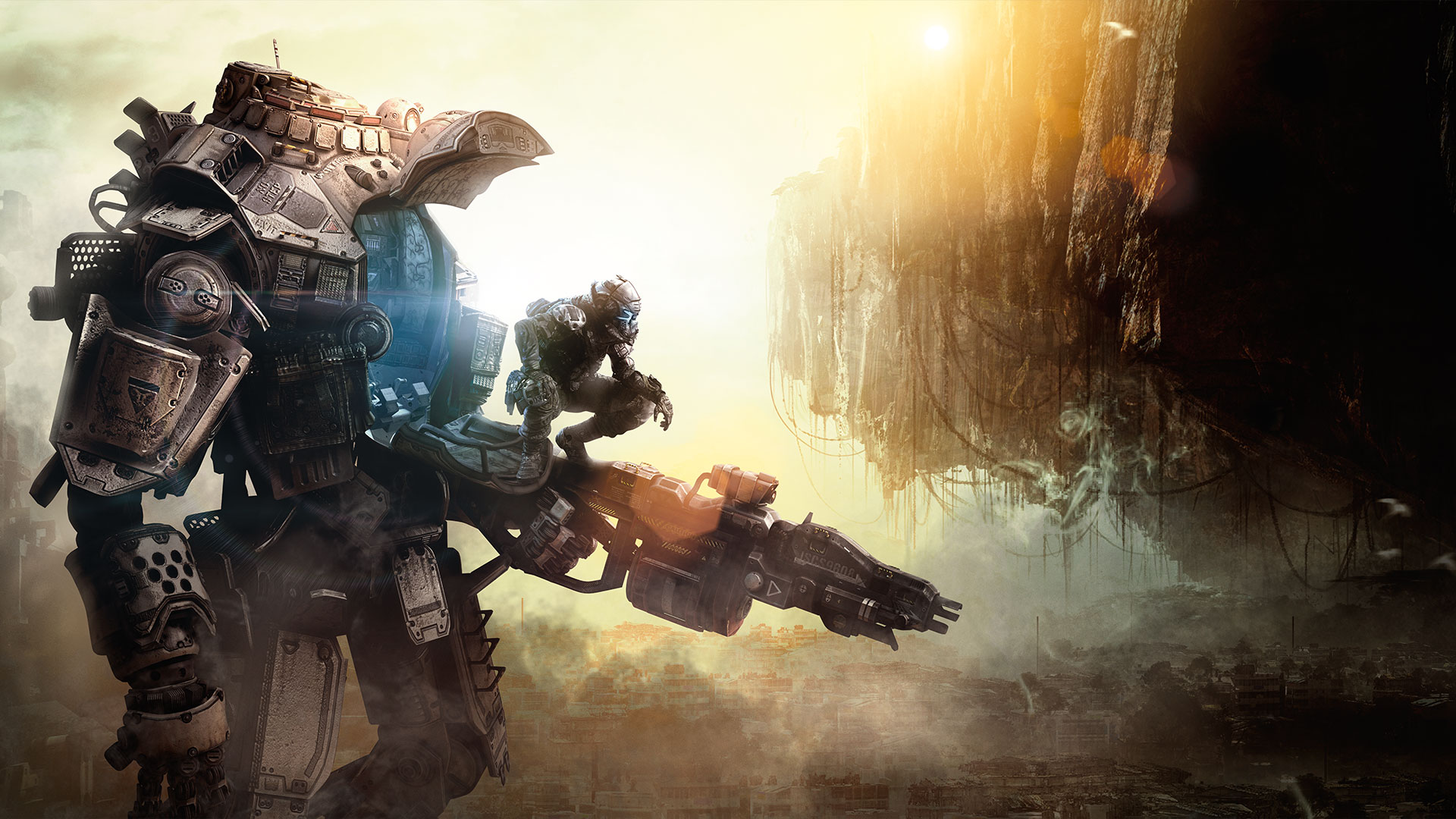Resident horror guru Matt delves into the twisted world of a deranged artist...
Titanfall Xbox 360 Review
When anyone utters the words ‘makers of Call of Duty’ and ‘giant robots’ in the same sentence, it’s only understandable that people get a little bit excited. Say what you will about Activision’s first person shooter franchise, but with a total of over 120 million units sold, Call of Duty’s reach and influence in the sphere of gaming is hard to deny. So large an influence perhaps, that Respawn Entertainment, the EA funded studio founded by Jason West & Vince Zampella, previously of Infinity Ward, must have felt the pressure of the colossal franchise they helped create, weighing down on them from the get go. The hypothetical question must have one day arisen – How do you take on a colossus? The answer seemed to be to simply bring a Titan. If anyone could do it, then who better than Respawn?
It was under the weight of this expectation that Titanfall, Respawn’s new futuristic FPS title hit the markets. The game’s packaging boasts of the title’s 60+ awards at E3, merely a feather in the cap of a game riding high on the shoulders of an aggressive marketing campaign and promised a next generation experience like no other. But after Titanfall’s March 11th release for the Xbox One & PC, reviews were mixed to say the least. Critics expected the second coming of the modern first person shooter, but instead received a competent game that could never live up to, the carefully orchestrated symphony of hysteria-inducing hype that told of it’s coming.
But a month after the games initial release, when the dust has settled and Titanfall finds itself on Microsoft’s Xbox 360, what then? When those expecting the next generation of gaming, have seen the emperor naked of new clothes, can Titanfall be judged solely on its merits as a console first person shooter?
For starters, let us look at Titanfall’s campaign. After promising a single player-like experience in a multiplayer setting, Respawn hit their first hurdle. By making the game online only, Titanfall polarized potential players from the very beginning. While only 18% of players completed Call of Duty Black Ops’ campaign, it is still a very daunting thought not to have a campaign in a full retail title.
To some, the idea of paying full price for a multiplayer game, in a constantly shifting multiplayer environment and especially with a new IP, is a scary thought. What if months down the line, nobody is playing Titanfall online? Then the game has a sell by date, a prospect that alarms most gamers who primarily vote with their wallets.
These grievances aside, what Titanfall offers in terms of a campaign is an ambitious idea, but on the whole will leave gamers wanting. For all its promises of user’s creating their own story, Titanfall’s campaign is simply Halo 4’s Spartan Ops. Small episodic chunks of story, which consist of nothing more than an in-engine cut scene and audio logs played over combat.
As for length, while the campaign is split into two opposing factions, the surprisingly well armed Frontier Militia, and the seeming evil Interstellar Manufacturing Corporation, both of which offer the perspective of each army and their struggles, not a lot changes. Win or lose, the story plods along to its slow and unsatisfactory conclusion. Though the story the game tells isn’t the most fascinating, its absence in the game’s regular multiplayer modes in noticeable, and even though the writing isn't the best, the contextualization of why these armies is fighting, feels strangely gratifying.
While only two of the game’s six multiplayer modes are playable here (Attrition, the game’s Team Deathmatch & Hardpoint, i.e. three point King of the Hill), experiencing them as part of the campaign is arguably more fun than without it.
In the campaign, the player takes the roll of a pilot, the game’s customisable soldier. Here a player experiences the game’s custom load outs and perks, as you would expect from any modern day shooter. However what Titanfall gets right is that like Halo, the weapon’s the player starts with are perfectly capable tools to play the game. The player is not penalized for their newness like in Call of Duty, or their lack of Premium Membership like in Battlefield 4. Even when fighting the game’s titular Titans, players start off with the right gun’s to make scrap metal of the metal mechs with ease, if they have enough skill to use them.
Where Titanfall’s game play differs from most modern FPS games is that in campaign and multiplayer, the player meets not only enemy players but AI with varying levels of skill, all of which gives XP. These AI make the seemingly limited 6 vs 6 experience feel on par with Battlefield 4’s 64 player Multiplayer. But more than simply filling up the numbers, these bots speed up the generation of the game’s selling point but also its biggest missed opportunity: The Titans.
Titans are mobile suits that offer the player further levels of customization of play, more powerful weapons and a personal robot killing machine to boot. Player’s can either pilot these Titans, or simply allow them to roam around the map, AI controlled killing enemy players for you. While Titan’s can be used strategically, using them guard a base in Hardpoint, or roam around covering your back in Attrition, I often found myself letting my Titan simply roam around scoring kills for me, as in an otherwise fast paced, no-nonsense FPS, Titan’s really slow things down. It’s both a blessing and a curse – the Titan’s speed restrictions stop them from being Battlefield’s Tanks and Choppers and dominating infantry, however it also derails what should be the selling point of the game, Titan vs. Titan action. Why would you ride a slow moving, large target into battle, when you can dispatch a Titan more efficiently with basic Anti-Titan weaponry? Especially when wall-running and the traversing of the environment is encouraged as a pilot?
The game’s Multiplayer options outside of campaign are also a mixed bag. While the game touts six modes, as well as Attrition & Hardpoint, there’s Last Titan Standing (a Titan vs. Titan mode which suffers from the pre-mentioned problems), Capture the Flag & Pilot Hunter (Team Deathmatch without AI kills counting).
The sixth mode is called ‘Variety Pack’ and is essentially a mixture of all other game modes. When you consider that Pilot hunter is simply a variant of Attrition, meaning the game only launched with four game types, Titanfall’s cracks start to show.
While there are certainly fun reasons to play Titanfall, and the game’s introduction of mechanics such as burn cards, cards that can be used for one spawn to deal extra damage or gain more XP, are fun, but they aren't essential to the experience. Despite supposedly being in development since 2010, Titanfall almost feels like a Beta game. With limited unlocks, the prospect that game modes that would have otherwise been on disk being included in downloadable content, as well as a seemingly limited lifespan. While there is the possibility of unlocking Generations, the game’s equivalent of prestige, this offers little but bragging rights, and makes Titanfall a great game that feels half cooked.
All promises aside, all hype deflated, Titanfall is the start of what proves to be a great first person shooter franchise. Despite its short comings, it is a strong basis for Respawn to build off of. The mechanics are there, they just need tweaking. The things it’s borrowed from other games, be it Mirrors Edge’s parkour or Left for Dead’s fighting for survival until extraction, are perhaps the right ones. That when combined with solid shooting and balanced weapons, feel new and exciting. While Titanfall doesn't deliver on its promise of a next gen experience like no other, but it’s certainly a fun, highly playable shooter that shows glimmers of greatness.




